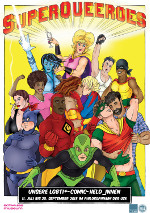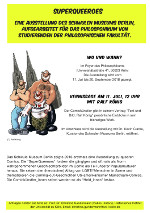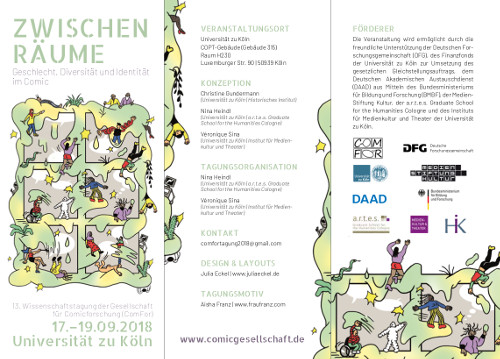We are happy to announce the publication of the proceedings of the 13th annual ComFor conference that took place in September 2018 in Cologne. Edited by ComFor members Véronique Sina und Nina Eckhoff-Heindl, the edited volunme Spaces Between: Gender, Diversity, and Identity in Comics contains numerous contributions by members and non-members.
Nina Eckhoff-Heindl and Véronique Sina (eds.)
Spaces Between: Gender, Diversity, and Identity in Comics
Springer, 2020
ISBN 978-3-658-30115-6
Publisher’s description:
“The contributions gathered in this volume exhibit a great variety of interdisciplinary perspectives on and theoretical approaches to the notion of ‘spaces between’. Theydraw our attention to the nexus between the medium of comics and the categories of difference as well as identity such as gender, dis/ability, age, and ethnicity, in order to open and intensify an interdisciplinary conversation between comics studies and intersectional identity studies.” → go to publisher’s website
Contents:
- Cocca, Carolyn: “Reproducing Inequality and Representing Diversity: The Politics of Gender in Superhero Comics”
- Blank, Juliane: “Gendered Violence and Structures of Power. Reclaiming the Victim Narrative in the Netflix Show Marvel’s Jessica Jones“
- Brown, Jeffrey A.: “Spider-Analogues: The Unmarking and Unmasking of White Male Superheroism”
- Crawford, Philip: “My Noose Around that Pretty’s Neck: Meditations on Matt Baker’s Good Girls“
- Miller, Ann: “The Nude and the Naked: From Fine Art to Comics”
- Rauchenbacher, Marina, and Katharina Serles: “Fragmented and Framed. Precarious ‘Body Signs’ in Comics by Regina Hofer, Ulli Lust, Barbara Yelin and Peer Meter”
- Veith, Natalie: “Othering Voices and the Voice of the Other: The Depiction of Joseph Merrick in From Hell“
- Neldner, Jonas: “Dis/ability and Hybridity: The Bodies of Charles Burns”
- Becker, Romain: “The Binary Comics of a Non-binary Artist: How Vaughn Bodé’s Identity Structured His Art”
- Eckhoff-Heindl, Nina: “Branford the Best Bee in the World. The Socio-Culturally Imprinted Self of Anthropomorphic Bodies”
- Sina, Véronique: “‘If only I’d had a nose job’. Representations of the Gendered Jewish Body in the Works of Aline Kominsky-Crumb”
- Berndt, Jaqueline: “Manga Aging: Grannies and Gutters”
- Oksman, Tahneer: “An Art of Loss”
→ Conference report of the 13th annual ComFor conference
→ Overview of all annual ComFor conferences
→ Overview of all conference proceedings
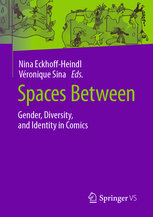

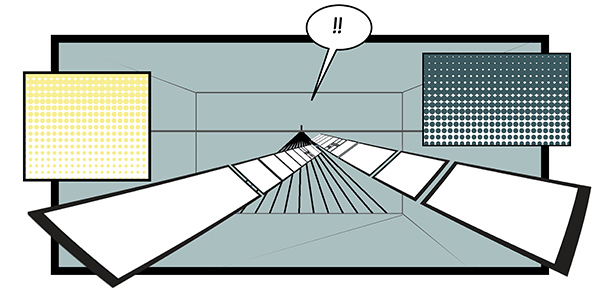 We return a few days earlier from our summer break on the occasion of the announcement of the laureate of the Martin-Schüwer Prize 2019. The prize is a joint venture of the ComFor and the Committee for Comic Studies (
We return a few days earlier from our summer break on the occasion of the announcement of the laureate of the Martin-Schüwer Prize 2019. The prize is a joint venture of the ComFor and the Committee for Comic Studies (

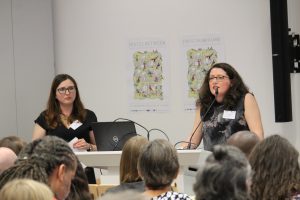 At the official beginning of the conference on Monday, the conveners Véronique Sina and Nina Heindl, as well as Manuela Günter (Vice-Rector for Gender Equality and Diversity of the University of Cologne), and Stephan Packard (President of the German Society for Comics Studies) welcomed all speakers and guests. They stressed that it is their great pleasure to open a conference that not only focuses entirely on gender, diversity, and identity in comics, but also presents a majority of female speakers as well as an all-female organizational team – a premiere for the German Society for Comics Studies.
At the official beginning of the conference on Monday, the conveners Véronique Sina and Nina Heindl, as well as Manuela Günter (Vice-Rector for Gender Equality and Diversity of the University of Cologne), and Stephan Packard (President of the German Society for Comics Studies) welcomed all speakers and guests. They stressed that it is their great pleasure to open a conference that not only focuses entirely on gender, diversity, and identity in comics, but also presents a majority of female speakers as well as an all-female organizational team – a premiere for the German Society for Comics Studies.